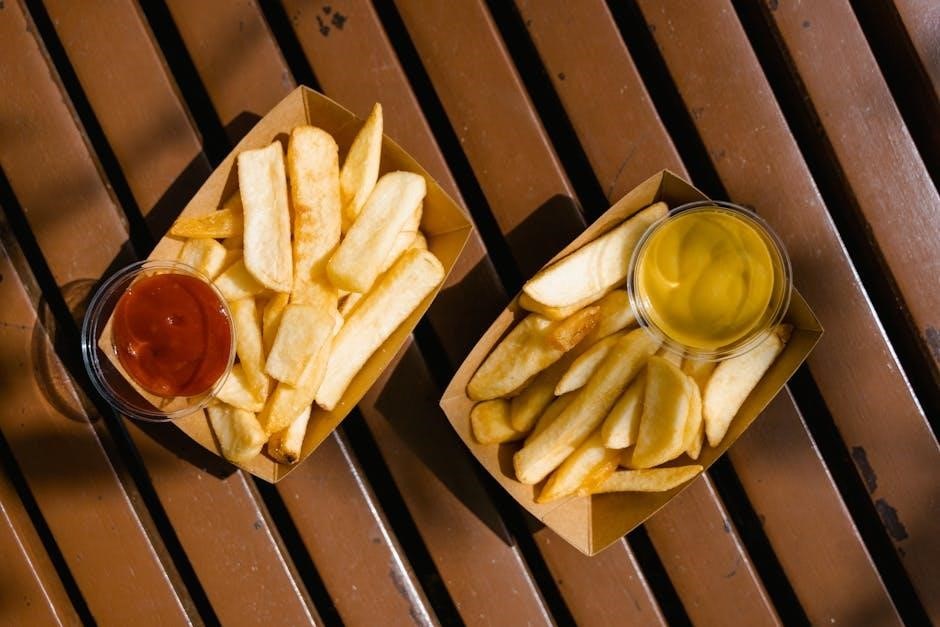
calorie deficit meal plan pdf
Understanding Calorie Deficit and Its Importance for Weight Loss
A calorie deficit is the cornerstone of weight loss, achieved by consuming fewer calories than your body burns. This forces your body to use stored fat for energy, leading to sustainable weight reduction. Maintaining a calorie deficit ensures your body consistently burns more energy than it absorbs, promoting fat loss while preserving muscle mass. It’s essential to balance calorie restriction with nutrient-dense foods to avoid extreme deprivation and support overall health.
What Is a Calorie Deficit?
A calorie deficit occurs when you consume fewer calories than your body burns, creating an energy shortfall. This forces your body to use stored fat for fuel, leading to weight loss. It’s measured by the difference between your daily calorie intake and expenditure. For example, eating 1,500 calories while burning 2,000 calories results in a 500-calorie deficit. This concept is fundamental to weight loss, as it ensures your metabolism consistently relies on stored energy, promoting fat reduction while maintaining muscle mass.
How Calorie Deficit Leads to Weight Loss
A calorie deficit creates an energy shortfall, prompting your body to burn stored fat for fuel. This metabolic shift leads to steady weight loss. By consistently consuming fewer calories than your body expends, your metabolism relies on fat reserves, reducing body fat. A structured meal plan ensures this process is sustained, promoting gradual and healthy weight reduction while maintaining muscle mass and energy levels. This method is scientifically proven to be effective for long-term fat loss and improved body composition.
Why a Calorie Deficit Meal Plan Is Effective
A calorie deficit meal plan is effective because it provides a structured approach to consuming fewer calories than your body burns. This ensures consistent fat loss while maintaining essential nutrients. By focusing on balanced meals, it prevents extreme hunger and supports metabolism. The plan’s effectiveness lies in its sustainability, helping you stay on track without feeling deprived. It also promotes mindful eating and healthier food choices, making it a reliable strategy for achieving and maintaining weight loss goals over time.
Benefits of a Calorie Deficit Meal Plan
A calorie deficit meal plan promotes sustainable weight loss, boosts metabolism, and helps maintain muscle mass. It ensures nutrient-dense eating, supports fat loss, and enhances overall health.
Sustainable Weight Loss
A calorie deficit meal plan supports sustainable weight loss by creating a consistent energy imbalance, where your body burns more calories than it consumes. This approach avoids extreme calorie restriction, ensuring your metabolism remains active and preventing plateaus. By focusing on nutrient-dense foods, you maintain energy levels and overall health. Sustainable weight loss is achieved through gradual fat loss while preserving muscle mass, making it easier to keep the weight off long-term. A well-structured plan adapts to your needs, ensuring steady progress without deprivation.
Improved Metabolism
A calorie deficit meal plan can enhance metabolism by encouraging your body to burn fat efficiently. Eating nutrient-dense foods, including lean proteins and healthy fats, supports metabolic function. A balanced deficit prevents extreme calorie restriction, which can slow metabolism. Incorporating regular meals and snacks helps maintain energy levels, promoting a steady metabolic rate. Over time, this approach supports long-term weight management and improves how your body processes calories, fostering a healthier metabolic state without starvation or deprivation.

Maintenance of Muscle Mass
A calorie deficit meal plan helps preserve muscle mass during weight loss by ensuring adequate protein intake. Prioritizing lean proteins, such as chicken, fish, and legumes, supports muscle maintenance. Balanced meals with sufficient fiber and healthy fats also play a role in sustaining muscle tissue. Additionally, incorporating strength training exercises can further protect muscle mass while burning fat. This approach ensures that weight loss primarily comes from fat stores rather than muscle, promoting a leaner and healthier physique over time.

How to Create a Calorie Deficit Meal Plan
Start by calculating your daily caloric needs and designing balanced meals with protein, fiber, and healthy fats. Incorporate nutrient-dense foods to support metabolism and satisfaction.
Calculating Your Daily Caloric Needs
To create an effective calorie deficit meal plan, start by estimating your daily caloric needs. Multiply your current weight by 12 to determine your maintenance calories. For weight loss, aim for a deficit of 500-750 calories daily. Consider your activity level, as highly active individuals may require more calories. Use online calculators or consult a professional for accuracy. Adjust your intake based on progress and goals to ensure sustainable fat loss while maintaining muscle mass and energy levels.
Designing Balanced Meals

A well-structured meal plan balances macronutrients and micronutrients to ensure nutrient density while maintaining a calorie deficit. Incorporate lean proteins like chicken and fish, whole grains, and a variety of colorful vegetables to provide essential vitamins and minerals. Healthy fats, such as avocados and nuts, support satiety and overall health. Each meal should be portion-controlled to prevent overeating, keeping you on track with your weight loss goals without compromising nutritional value or flavor.
Incorporating Protein, Fiber, and Healthy Fats
In a calorie deficit meal plan, protein, fiber, and healthy fats are crucial for maintaining satiety and overall health. Protein preserves muscle mass and boosts metabolism, while fiber aids digestion and keeps you full longer. Healthy fats, like avocados and nuts, provide essential nutrients and satisfaction. Balancing these nutrients ensures your meals are nutritious and filling, preventing extreme hunger and supporting sustainable weight loss without compromising flavor or nutritional value.

Sample Calorie Deficit Meal Plan (PDF)
Download a detailed 7-day calorie deficit meal plan, tailored to your needs, with breakfast, lunch, dinner, and snack options to support sustainable weight loss effectively.
7-Day Meal Plan Example
A sample 7-day meal plan offers structured breakfast, lunch, dinner, and snack options, ensuring a calorie deficit while providing balanced nutrition. Each day focuses on lean proteins, fiber-rich vegetables, and healthy fats to keep you satisfied. For example, breakfast might include scrambled eggs with spinach, lunch could be grilled chicken with quinoa and broccoli, and dinner might feature baked salmon with sweet potatoes. Snacks like nuts or Greek yogurt with berries are included to maintain energy levels; Adjust portions based on your caloric needs and activity level to maximize weight loss results while staying nourished.
Breakfast, Lunch, Dinner, and Snack Options
Your meal plan includes nutrient-rich options like scrambled eggs with spinach for breakfast, grilled chicken with quinoa and steamed vegetables for lunch, and baked salmon with sweet potatoes and green beans for dinner. Snacks such as Greek yogurt with berries or a handful of nuts provide energy boosts. Each meal is portion-controlled to maintain a calorie deficit while ensuring balanced nutrition. Adjust ingredients based on dietary preferences and calorie needs for optimal weight loss results.
Adjusting the Plan Based on Individual Needs
Customizing your calorie deficit meal plan ensures it suits your lifestyle and goals. If you’re more active, increase portion sizes or calorie intake slightly. For dietary preferences, swap ingredients like swapping meat for plant-based proteins. Adjust macronutrient ratios to maintain muscle mass or manage hunger. Regularly reassess progress and tweak portions or food choices to avoid plateaus. Consulting a healthcare professional can help tailor the plan further, ensuring it aligns with your health needs and promotes sustainable weight loss effectively;

Common Mistakes to Avoid in a Calorie Deficit Diet
Common mistakes include extreme calorie restriction, leading to nutrient deficiencies, neglecting nutrient-dense foods, and ignoring hydration and portion control, which can hinder sustainable weight loss.
Extreme Calorie Restriction
Extreme calorie restriction can lead to nutrient deficiencies, muscle loss, and a slowed metabolism. Severely limiting calories may result in fatigue, decreased performance, and a higher risk of binge eating. While a calorie deficit is essential for weight loss, it should not be so drastic that it compromises overall health. A safe and sustainable deficit of 500-750 calories below maintenance is often recommended to avoid these negative effects and ensure long-term success. Balance is key to maintaining health while losing weight.
Neglecting Nutrient-Dense Foods
Neglecting nutrient-dense foods in a calorie deficit diet can lead to nutrient deficiencies, weakened immunity, and low energy levels. It’s crucial to include whole, unprocessed foods like fruits, vegetables, lean proteins, and whole grains, which provide essential vitamins, minerals, and fiber. Without these, muscle mass may decrease, and metabolism slows, making weight loss harder. A balanced meal plan ensures sustained energy and supports long-term health and weight loss success effectively.
Ignoring Hydration and Portion Control
Ignoring hydration and portion control can hinder weight loss efforts, even with a calorie deficit. Inadequate hydration slows metabolism and increases hunger, leading to overeating. Similarly, neglecting portion sizes can result in consuming more calories than intended, undermining the deficit. Proper hydration and mindful portion control are essential for maintaining energy balance and ensuring the diet’s effectiveness. Drinking water and measuring food portions help avoid excessive calorie intake and support sustainable fat loss. Staying hydrated also enhances overall health and metabolism function.
Consulting a Healthcare Professional
Consulting a healthcare professional ensures a personalized and safe approach to your calorie deficit meal plan. They provide tailored advice, addressing specific needs and health conditions, optimizing results while minimizing risks. Expert guidance helps create a balanced and sustainable plan, enhancing weight loss effectiveness and overall well-being through professional oversight and support.
Importance of Professional Guidance
Professional guidance is crucial for creating a safe and effective calorie deficit meal plan. A healthcare professional or dietitian tailors the plan to your specific needs, ensuring it promotes sustainable weight loss while maintaining nutrient balance. They help avoid extreme calorie restriction and nutrient deficiencies, providing expert advice to optimize results. Professional oversight also helps prevent common mistakes, like neglecting hydration or portion control, ensuring the plan is both realistic and aligned with your health goals for long-term success.
Customizing the Meal Plan for Better Results
Customizing your calorie deficit meal plan ensures it fits your lifestyle and goals, making it more sustainable. By considering age, weight, height, and activity level, you can tailor portion sizes and food choices to meet your specific needs. Balancing protein, fiber, and healthy fats keeps meals satisfying and supports metabolism. Incorporating your favorite foods ensures enjoyment and long-term adherence. Regularly adjusting the plan based on progress and feedback ensures continued success and safety. This approach avoids extreme restrictions and ensures you get all necessary nutrients. Working with a healthcare professional or dietitian can help refine your plan for optimal results.
Ensuring Safety and Sustainability
Ensuring the safety and sustainability of a calorie deficit meal plan is crucial for long-term success. Consulting a healthcare professional helps tailor the plan to individual needs, avoiding extreme calorie restrictions that could harm health. Incorporating nutrient-dense foods supports overall well-being and maintains muscle mass, essential for metabolism. A balanced approach prevents nutrient deficiencies and ensures the plan is sustainable, helping individuals adhere without feeling deprived. This method promotes a healthier lifestyle and discourages rapid, unhealthy weight loss practices.